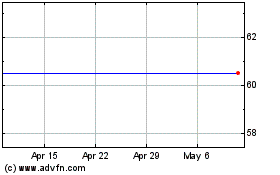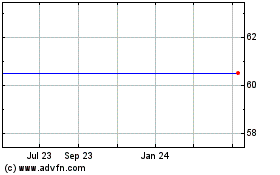Kraft Heinz's Interest in Unilever Comes Right Out of 3G Capital's Playbook
February 20 2017 - 2:12PM
Dow Jones News
By Annie Gasparro
Behind Kraft Heinz Co.'s short-lived bid for rival packaged-food
giant Unilever PLC is a basic conundrum: The company is running out
of ways to improve profitability through its own cost cuts.
Kraft Heinz's operating-profit margins jumped last year, driven
by the aggressive cost-cutting methods of Brazilian private-equity
firm 3G Capital, which helped orchestrate Heinz's 2015 purchase of
Kraft and is the company's biggest shareholder.
But executives told investors last week that the potential for
additional savings was limited. Quarterly earnings beat Wall Street
expectations but cost cuts weren't as dramatic as some investors
anticipated, pressuring the company's shares and leaving some
hungry for another deal.
Kraft Heinz shares soared 11% in New York on Friday when it made
its $143 billion bid for Unilever public, but withdrew its offer
two days later, sending Unilever's shares down 7.8% in London on
Monday. An acquisition of the Anglo-Dutch consumer-goods giant
could have ultimately generated upward of $5 billion in savings
from the combined company's annual budget, according to people
familiar with the situation.
Kraft Heinz said buying rivals isn't the only way for it to
produce strong returns. Chief Financial Officer Paulo Basilio, also
a partner at 3G, said Wednesday that the company has decided to
make additional investments in marketing, improving food quality
and developing new products to boost sales.
Kraft Heinz has come out with new products like Heinz barbecue
sauce and a new line of frozen meals focused on using natural
ingredients.
"We don't need another acquisition to drive value," Mr. Basilio
said.
But investors in companies led by 3G, including Anheuser-Busch
InBev NV and Burger King operator Restaurant Brands International
Inc., have come to expect rapid returns. When savings max out a few
years after a merger, 3G has a habit of making another sizable
deal, beginning the process over again.
Even though discussions with Unilever are off the table, the
offer "serves as a reminder of Kraft Heinz's interest, capacity and
commitment to pursuing large-scale M&A in a potentially
near-term time horizon," said Barclays analyst Andrew Lazar.
3G is known for wringing costs out of businesses.
At Heinz, which they bought in 2013 along with Warren Buffett,
3G managed to strip out $1 billion in annual costs before acquiring
Kraft two years later. Last year, Kraft Heinz's operating-profit
margin expanded 5 percentage points to 23% of sales.
3G has helped bring similar profitability enhancements to Burger
King, which bought Tim Horton's in 2014 to create Restaurant Brands
International. RBI recently reported that its key profitability
metric rose 16% last year.
AB InBev, which was built by 3G's founders, has acquired major
brewers since 2008, including Mexico's Grupo Modelo, Korea's
Oriental Brewing and, most recently, SABMiller PLC. It moved to cut
several of those deals as growth in revenue and profitability
slowed.
For example, its pursuit of SABMiller came as it struggled to
revive Budweiser in the U.S., its biggest market, and faced an
economic downturn in Brazil, its second-biggest market. Acquiring
SABMiller gave it not only a new business with costs to cut but
also new geographies like Africa and parts of South America that
reduced its dependence on the U.S. and Brazil.
When 3G partners invests in a company, they first apply
zero-base budgeting -- a stringent method of managing costs that
requires each department to justify all expenses again every year,
instead of working off the previous year's budget.
That results in more virtual meetings rather than traveling,
fewer free snacks around the office, executives jettisoning
first-class flights, and permission required for employees to make
color photocopies. 3G also typically saves money by eliminating
hundreds of management jobs, negotiating better pricing on
ingredient costs and downsizing underused factory lines.
The need for cost cuts is exacerbated by changing consumer
tastes and priorities that are shaking up the food industry. Kraft
Heinz, which logged $26.5 billion in sales last year, in 2015 said
the deal would allow the combined conglomerate to revive the center
aisles of supermarkets. But its comparable sales inched up 0.3%
last year after falling 1.6% in 2015.
David Garfield, a food consultant at AlixPartners, said food
makers are partly driven to consolidate to increase their scale,
which gives them more purchasing power and greater efficiency in
manufacturing. "It's not just about being bigger for the sake of
size."
--Tripp Mickle contributed to this article.
Write to Annie Gasparro at annie.gasparro@wsj.com
(END) Dow Jones Newswires
February 20, 2017 13:57 ET (18:57 GMT)
Copyright (c) 2017 Dow Jones & Company, Inc.
Unilever NV (NYSE:UN)
Historical Stock Chart
From Mar 2024 to Apr 2024

Unilever NV (NYSE:UN)
Historical Stock Chart
From Apr 2023 to Apr 2024
